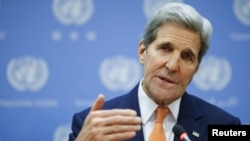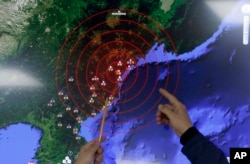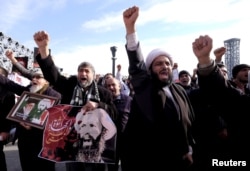Secretary of State John Kerry says implementation of the Iran nuclear deal could be just “days away,” if “all goes well.”
He commented in a Thursday briefing in which he highlighted U.S. foreign policy progress over the past year and urged U.S. lawmakers to confirm key diplomatic nominations that have languished in the Senate.
Kerry said he spoke to Iranian Foreign Minister Mohammad Javad Zarif, who assured him that Iran intended to complete its obligations “as rapidly as possible.”
The so-called Implementation Day will occur when the U.N. nuclear watchdog verifies that Iran has met requirements to the agreement, known as the Joint Comprehensive Plan of Action.
As a result of compliance, Iran would receive relief from crippling international nuclear-related sanctions. Late last year, Iranian President Hassan Rouhani predicted Iran would reach Implementation Day by mid-January.
Kerry said Thursday that Tehran has already shipped most of its stockpiles of enriched uranium overseas.
“It literally shipped out its capacity, currently, to build a nuclear weapon,” he said.
Meanwhile, Congressional Republicans moved to give Congress more authority to scuttle the deal. The House Foreign Affairs Committee cleared a measure Thursday that would give lawmakers more oversight of the agreement Iran signed with the U.S. and other nations last summer. Reuters reported the bill could go before the full House as early as next week.
North Korea not ‘unattended’
Kerry highlighted foreign policy progress made during the past year, including the re-opening of the U.S. embassy in Havana and U.S.-led coalition efforts that have cut the Islamic State’s territory in Syria and Iraq.
Asked if the U.S. lost its focus on North Korea because of challenges in other regions, Kerry said “North Korea has never been left unattended to, not for one day.”
He commented after North Korea conducted what it said was a “successful” test of a hydrogen bomb, this week, an action that the U.S. and other world powers have deemed “provocative.”
Earlier Thursday, Kerry discussed North Korea’s nuclear test with Chinese Foreign Minister Wang Yi. China, North Korea’s key regional ally, has condemned the test.
In his remarks, Kerry said Beijing had “had a particular approach that it wanted to take,” and that the U.S. had agreed to give the Chinese opportunity to implement that. But Kerry added that during his talks with Wang, he made it clear that the approach had not worked and the U.S. could not continue “business as usual.”
Middle East tensions
Kerry also addressed concerns that escalating tensions between Iran and Saudi Arabia could hamper this month’s planned launch of U.N.-led talks on a political transition in Syria.
Both Iran and Saudi Arabia are part of the International Syria Support Group.
However, Saudi Arabia cut diplomatic ties with Iran this month after protesters stormed Saudi missions in Iran. The protesters were angered by Saudi Arabia’s execution of a Shi’ite cleric.
Kerry said in recent days, he spoke to his counterparts in both countries and they offered assurances that differences between them would not interfere with their willingness to work cooperatively to address Syria’s crisis.














